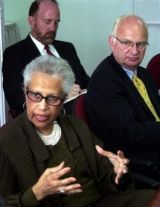US optimistic peace will hold in Sudan
KHARTOUM, Aug 7, 2005 — U.S. officials expressed optimism Sunday that Sudan’s fragile peace would hold and that a strong, unified new leadership would continue forward despite the death of dominant southern leader John Garang.

|
|
American officials in Khartoum expressed optimism Sunday Aug. 7 2005 that Sudan’s fragile peace would hold and that a strong, unified new leadership would continue forward despite the death of dominant southern leader John Garang. Connie Newman, front, head of the State Department’s Africa bureau, and Roger Winter, right, special representative to Sudan, said they were assured in recent days by leaders of the government and Garang’s Sudan People’s Liberation Movement that both sides are committed to implementation of the January peace agreement with no changes. (AP) |
Garang’s death in a July 30 helicopter crash sparked riots in Sudanese cities and raised fears that the peace agreement he helped reach in January might fall apart.
Connie Newman, head of the State Department’s Africa bureau, and Roger Winter, special representative to Sudan, said they were assured in recent days by leaders of the government and Garang’s Sudan People’s Liberation Movement that both sides are committed to implementation of the January peace agreement with no changes.
Winter, a negotiator in lengthy peace talks that finally that ended the 21-year north-south civil war, said Garang’s death at this time could be viewed as “destabilizing” but that he was optimistic anyway.
“Why do I think it is possible to be optimistic? First, the deal is done,” he said of the comprehensive peace agreement. “It’s recognized internationally, it’s legal, it’s the deal.”
The agreement, incorporated into the interim constitution last month, brought Garang to the capital as first vice president in a government of national unity. He died in a helicopter crash on July 30, just three weeks after being sworn in and before he and his partners in the presidency could name their Cabinet and the rest of the national unity government.
Winter and Newman also praised new SPLM head Salva Kiir Mayardit as a strong leader who would continue Garang’s plans for Sudan.
“His vision builds on that of Dr. Garang,” Newman said. “I can understand why the leadership decided that he was the right person to take over.”
“The man is no slouch intellectually, and he is a leader,” Winter said of Kiir, who has already taken over the SPLM and will be inaugurated as first vice president on Tuesday.
Newman said a team of five experts from the U.S. National Transportation Safety Board were in Nairobi ready to assist with the investigation into the crash.
“They’re the best that we have,” she said of the NTSB team.
The government and SPLM had said it was an accident but still plan an investigation and have asked other countries, including the United States, Uganda and Kenya, to assist.
She said the United States and other countries participating in the investigation would report to the national unity government, which is leading the probe.
In Juba, southern Sudan, the U.N. envoy for Sudan, Jan Pronk, applauded the moves that the SPLM and government have made to reassure people that the peace agreement has not died with Garang.
“It shows unity. It shows a commitment to peace and, perhaps, out of this very tragic accident, something good will flourish – a greater commitment to unity and peace than ever before,” after laying a wreath at Garang’s tomb, a day after he was buried in the Nile River city.
Pronk pressed the government and SPLM to form commissions to guide and monitor the implementation of key aspects of the peace accord.
“When these institutions are not there, you cannot easily go forward because the SPLM works separately, the government works separately and the United Nations (works separately). So we have to do it together,” Pronk said.
He said he urged Kiir on Sunday to resolve differences with pro-government militia in the south which are not part of the SPLM.
“There are groups which have become quite agitated of late,” Pronk said. He declined to say more about them, but NGO workers have told The Associated Press that some pro-government militiamen have recently kidnapped women and children, holding them as bargaining chips.
The NGO workers spoke on condition of anonymity as they feared straining their relations with the Sudanese government.
The peace provides for the militiamen to be integrated either into the national army or into a new army of southern Sudan, which will be dominated by their former enemy, the Sudan People’s Liberation Army.
(AP)
